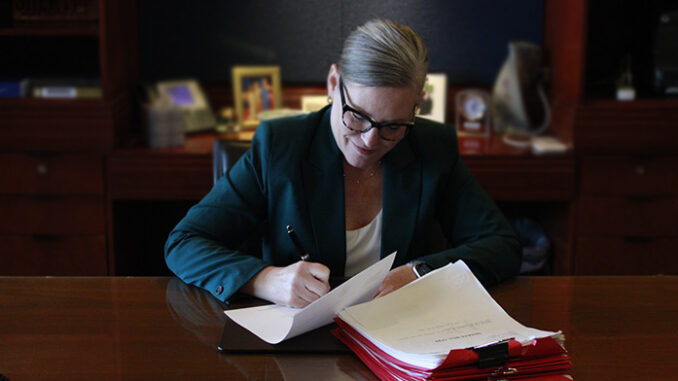
The integrity of our electoral process is vital to maintaining the foundations of democracy. Reliable and secure voting machines play a crucial role in the faith, trust, and confidence of our elections. Knowing and understanding this, the Arizona Legislature just passed H.B. 2613, which would have mandated voting machines used in state elections be made in America. Furthermore, this legislation would have required all those voting machines to have 100% of their parts and components sourced and assembled in the U.S.
Unfortunately for the people of Arizona, Governor Hobbs vetoed the legislation. In doing so, she turned her back on American manufacturing and election integrity.
The call for products to be made in America is not new. In fact, during his State of the Union address in 2023, President Biden emphasized the importance of domestic manufacturing, highlighting how American-made products would benefit the country’s economy and ensure national security. The proposed legislation in Arizona would have aligned with this vision, as it promoted the manufacturing of voting machines in the U.S., creating jobs and strengthening the domestic industry while simultaneously enhancing election security.
One of the primary benefits of requiring voting machines to be made in America is that it enhances election security. By mandating that all components are sourced and manufactured in the U.S., the legislation would have ensured that voting machines are built to the highest security standards, making them less susceptible to hacking, interference, and tampering. And if history is any guide and issues arise with machines on Election Day, it is much easier to find out what happened if the voting machine manufacturing plant is located in Buckeye and not Beijing. It also would have guaranteed transparency in the manufacturing process and ensured that any potential vulnerabilities could be addressed before the machines were used for elections.
Moreover, American-made voting machines would have given voters greater confidence in the electoral process, particularly at a time when concerns about election integrity are rising. By increasing transparency and accountability, these machines would help to alleviate doubts and promote trust in the democratic process.
Finally, the legislation would have allowed for a transition period before full implementation, ensuring a smooth transition and minimizing any potential disruptions to the electoral process. This provision would have ensured sufficient time for voting machine manufacturers to meet the new requirements, which would have minimized the impact on existing voting systems.
Requiring voting machines used in Arizona to be made in America is a sensible move that benefits everyone. By enhancing election security, increasing transparency, promoting domestic manufacturing, and supporting the American economy, this legislation would have represented a significant step toward ensuring the integrity of the democratic process. As President Biden emphasized in his State of the Union address, everything made in America benefits the country. Clearly, Governor Hobbs’ veto signals she does not support American workers, American manufacturing, or election integrity. The real question Arizonans have to ask is, “Why?”
Ambassador Ken Blackwell serves as the Chairman of America First Policy Institute‘s (AFPI) Center for Election Integrity. Blackwell has an extensive career in public service and is widely regarded as a leading expert on elections and election security. Prior to joining AFPI, Blackwell served as the mayor of Cincinnati, Ohio, and was also elected to serve as the Treasurer and Secretary of State for the State of Ohio. Blackwell also currently serves as a Senior Fellow for Human Rights and Constitutional Governance at the Family Research Council. He serves on the Board of Directors for the Public Interest Legal Foundation, the Near East News Agency, and the Institute for Pension Fund Integrity. Blackwell was formerly the United States Ambassador to the United Nations Human Rights Commission.
